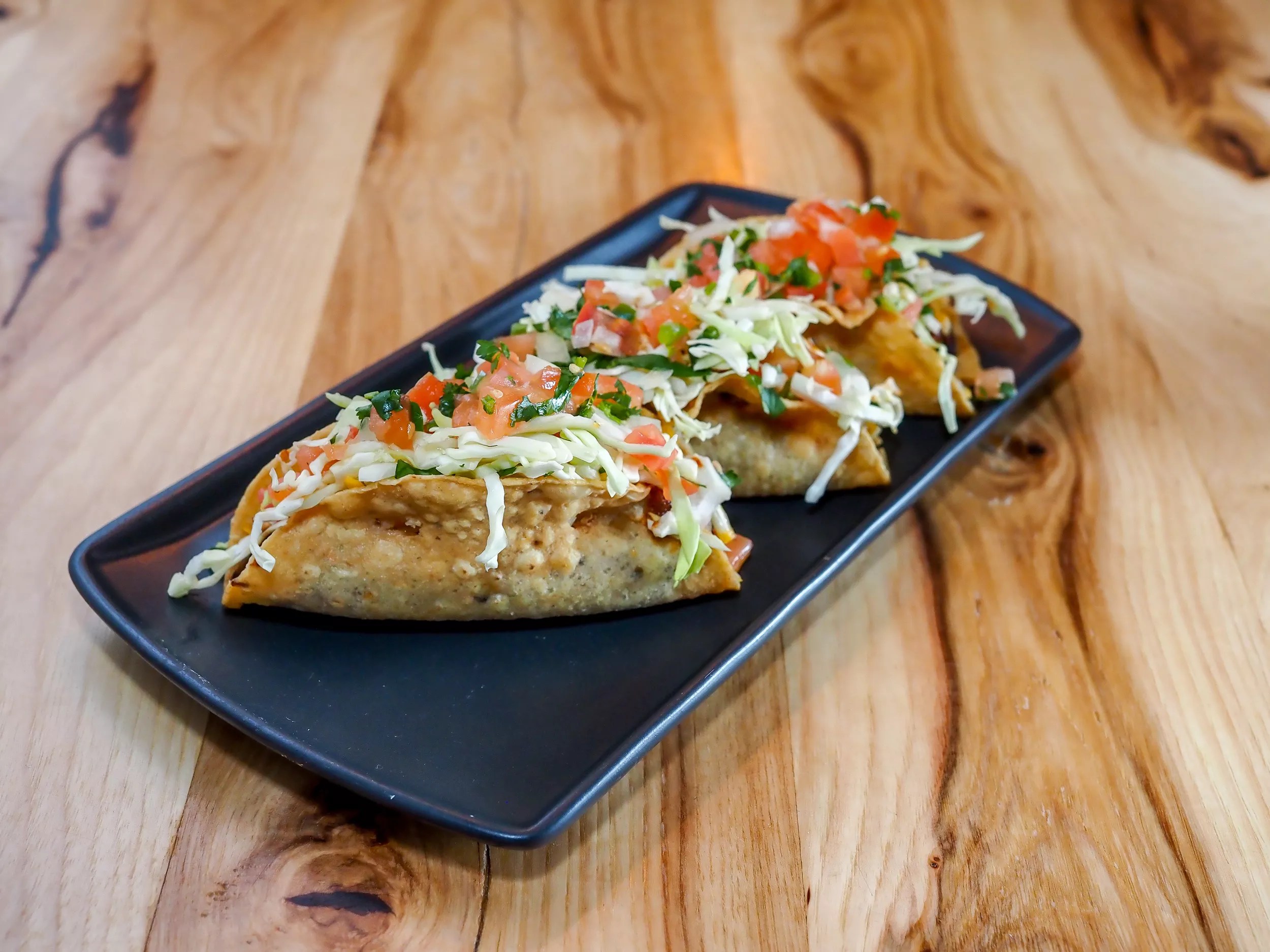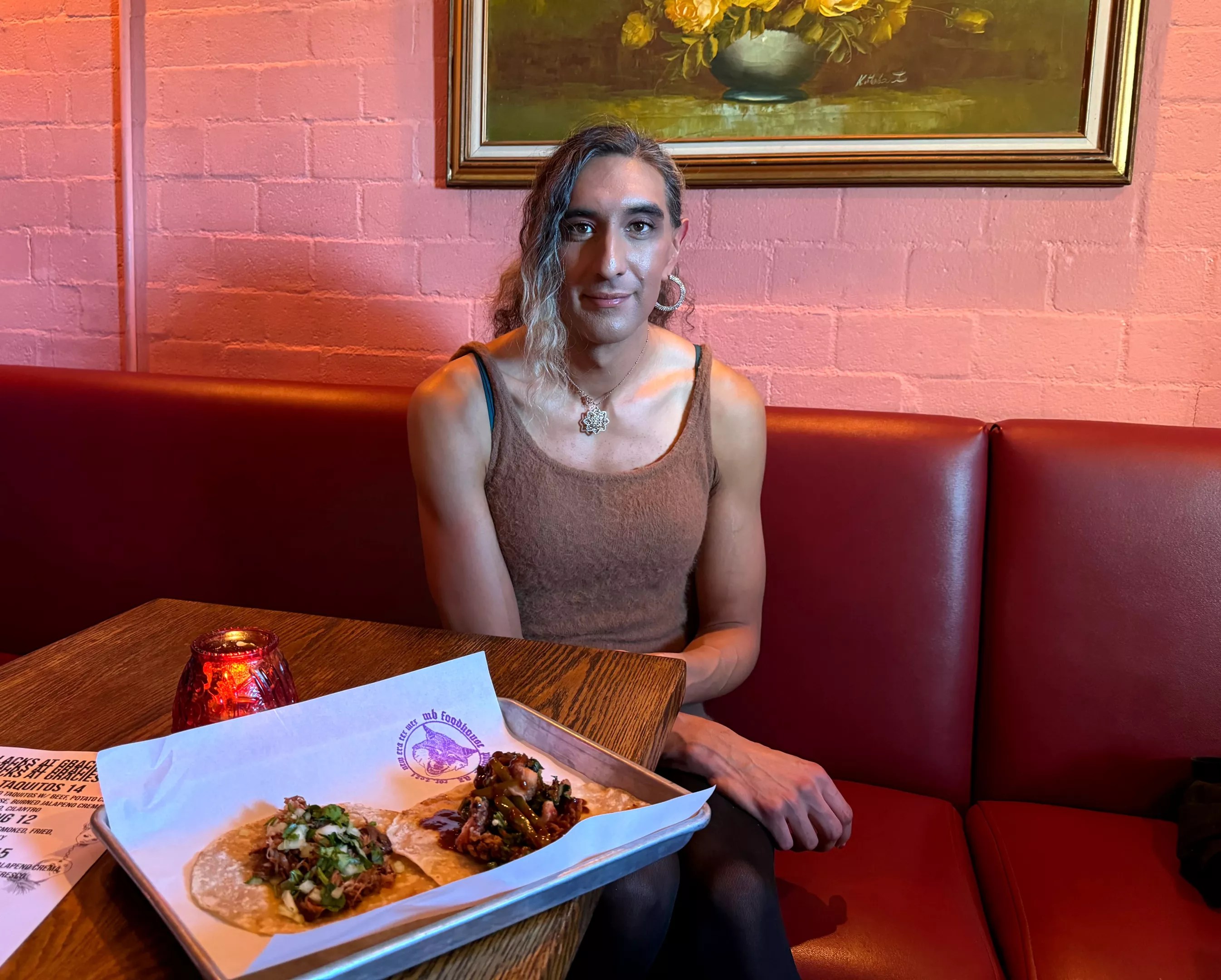
CRUjiente Tacos

Audio By Carbonatix
To say that Jose Ralat is passionate about tacos is an understatement.
He is Texas Monthly’s taco editor, a first-of-its-kind role he’s held since 2019. The two-time James Beard Award-winning writer also authored “American Tacos: A History and Guide.” A revised and expanded version was released in August. In the book, Ralat tells the story of taquerias from across the country, including Valley spots CRUjiente Tacos and Moodie Blacks.
The author will be in the Valley later this week on a book tour that’s making stops at some of those eateries.
“I want to bring this to the community and support the community,” Ralat says during a recent video chat. “I want to go where they are – they are at restaurants, bars, breweries.”
The author will host a book signing event with Moodie Blacks at Yucca Tap Room from 5:30 to 7:30 p.m. on Friday. He’ll also be part of the tortilla-stuffed Taco Fest taking place on Saturday and Sunday at Salt River Fields. Ralat will be tasting and judging tacos from the event’s 30-plus vendors. The two-day fest also will feature live music, bachata dancing lessons, multiple markets, a kids zone, a silent disco and more than 30 agave spirits brands.
In advance of Ralat’s visit to the Valley, we caught up with the author to find out which taco spot he likes to visit first when he lands in Phoenix, what kinds of tacos he thinks local taquerias do best and why he thinks “authenticity” is a four-letter word.
Note: this interview has been edited for clarity and length.

Jose Ralat, author of “American Tacos” and taco editor for Texas Monthly, will be in the Valley this weekend.
Jose Ralat
You first published “American Tacos” in 2020. How did you decide it was time to update and expand the book?
The book was always meant to be a living document. I’d always known that I would have to go back to it. And with the pandemic almost in the rearview mirror, the publisher and I decided it was time.
“American Tacos” was always meant to be the first chronicle of regional American tacos with a national scope. It had never been done before, so why not me? I see “American Tacos” as the culmination of peers and friends’ work, because without them laying the groundwork I don’t think I would have been able to do this.
Are there things that have struck you most about how tacos or taquerias have evolved since your first edition?
Well, I’ve noticed that tacos have changed dramatically in that the pandemic was both good and bad.
Small businesses are adept at adapting. That saved a lot of taquerias. And then you saw the ability for other businesses to come in because people didn’t have anything to lose partially, right? They’re like, “Well, if not now, when?”
So that’s the model, but the tacos themselves have been changing through foods of people’s hometowns, foods and flavors of people’s childhood.
For example, beef birria came to rise just before and then took off during the pandemic. It was real pretty and people could eat tacos because tacos were on the street, tacos were in drive-thrus, they were everywhere.
So you see this food that was developed in Tijuana by people from the same town in Puebla, Coatzingo, and they moved to Los Angeles, where it exploded and it spread across the world. As a matter of fact, I’m still reading about Mexican restaurants in places like Hong Kong, serving them.
That was interesting to me from an academic, cultural, anthropological point of view, because not many people make them well, but it sustained businesses.

The “American Tacos” guidebook offers a tour and history of the hand-held eats across the country.
American Tacos
With the guide element of the book, how do you determine which restaurants you want to elevate? How much of that is authenticity versus taste?
Let’s talk about authenticity. First of all, authenticity doesn’t exist. Authenticity is a nonstarter. It puts everything in a box and doesn’t allow whatever that food or thing is to evolve. It basically kills it.
How I usually describe it is your grandmother’s chocolate chip cookies aren’t the same as your best friend’s chocolate chip cookies, but they’re both chocolate chip cookies. They’re both legitimate.
That idea became the Abuelita Principle, which is to say everyone’s grandma makes authentic food or everyone’s grandma makes the only authentic food. What if your grandmother was a bad cook?
Second of all, I think we can all agree that there is a world beyond the bubble that is our own experience. So why not let things develop on their own? Why not see where things go? Mexican food is going to do what Mexican food wants to do, no matter what we think.
I hear a lot of times from immigrants, “we didn’t know so much about Mexican food until we moved here” or “we didn’t know how vast Mexican food really was until we moved to the U.S.” That’s fantastic!
But, at the same time, I wanted to show people really great stories and as a way to chronicle the history of tacos in the U.S. A lot of it just sort of happened while I was doing it.
I interviewed this young woman in Los Angeles who had her own Korean-Mexican taco stands and she said that her family would have cookouts in the park next to Mexican families and they were trading ingredients and then at work people were trading ingredients. This is in the ’90s well before Roy Choi decided to put it on a taco truck and leverage social media. What he did was just sort of codify it and allow others to further codify it as it went national. And it went national quickly. Had it not been for Roy Choi, K-Mex would have probably remained a super regional taco that no one’s ever heard of. I think that’s fascinating.
I wish I could have put in a chapter about burritos, but oh my God, that history.
That may be another book.
It may be another book, because we don’t really know where it comes from. Is it Sonora? Is it Chihuahua? To me it doesn’t matter; what matters is the variability and diversity – across the Southwest and up to California, down to Sonora and Chihuahua, up to Denver.
I think that the best burritos are the Sonoran style with the big flour tortillas and Juarez-El Paso style, which is just one filling and it’s smaller. I think those are fascinating. I don’t know why you need to put so much stuff in there. But I believe burritos are tacos and I have the history to back that up.
You land in Phoenix. What’s the first place you want to visit for tacos?
Wherever (Taco Fest Founder) Dave Tyda tells me.
No, I would say Tacos Chiwas. They give you a little taste of Chihuahua. It’s a start and it’s fun, and then what I really like to do more than anything else is finding new places.
I have a small list of places like Taco Viva. Bacanora’s not really on my list because it doesn’t have a large menu but I can get other variations of that menu elsewhere. CRUjiente Tacos is amazing in the way that it stays true to the flavors and the traditions while showing everyone that tradition also has its own variability.
Is there anything that you find to be unique or distinct about the tacos that you’ve had in the Phoenix area compared to others?
You guys have amazing carne asada. It’s just Arizona, Sonora. There’s no competing.
Some of the best flour tortillas I’ve ever had – probably the greatest. How fascinating are those tortillas that are so thin, yet so strong? That is amazing to me. What is the physics behind that? Because it’s incredible.
Carne asada is something I have a love-hate relationship with, except when I go to Arizona. Then I know I’m going to have a great time, I’m going to have great tacos.
Then you have the guisos that are traditional to the area. I go for that always. It’s very rare that I’ll ask for a taco al pastor in Arizona. I will ask for fry bread if they have fry bread tacos, heck yeah. They can be amazing and Fry Bread House is a prime example. And the history behind that makes them even better.
Food is great; we all need it. But the stories behind the food can make the difference between a mediocre meal and a great meal because through a conversation you can be able to learn more about who the people behind the food are. That shows you what goes in the food, why the food is the way it is.

Kristen Martinez launched MB Foohouse as a pop-up and food trailer in Phoenix in 2023 before moving to the kitchen at Yucca Tap Room as Moodie Blacks. She will host a book signing event with “American Tacos” author Jose Ralat on Friday.
Sara Crocker
You’re going to be at Taco Fest. Are there any folks that are going to be there that you are particularly excited to see?
I know that some of my favorites will be there, but I’m really excited to eat the food. I’m sure there’s going to be so many surprises and so many wonderful things to eat. I’m also really excited to support Kristen Martinez (of Moodie Blacks).
How did you come across her food, and did it strike any chord with you as a Texan?
Yes. I don’t remember how I got a hold of her or how I came across the pop-up. It was serendipitous because she ended up having a great story that I didn’t even imagine could be such a story. For me to channel her story to a greater public was an honor.
I think that what I do is an honor and a responsibility. No one has to talk to me so I do this at their discretion.
Have you thought about a third edition of “American Tacos”?
I would like to branch out and do other types of taco books. Just burritos would be great but I think that a children’s book or photo book or quasi-manuals would be fun. I have a lot of ideas, at least a page of ideas. I’m lucky to forever get new ideas. It’s part of my curiosity.